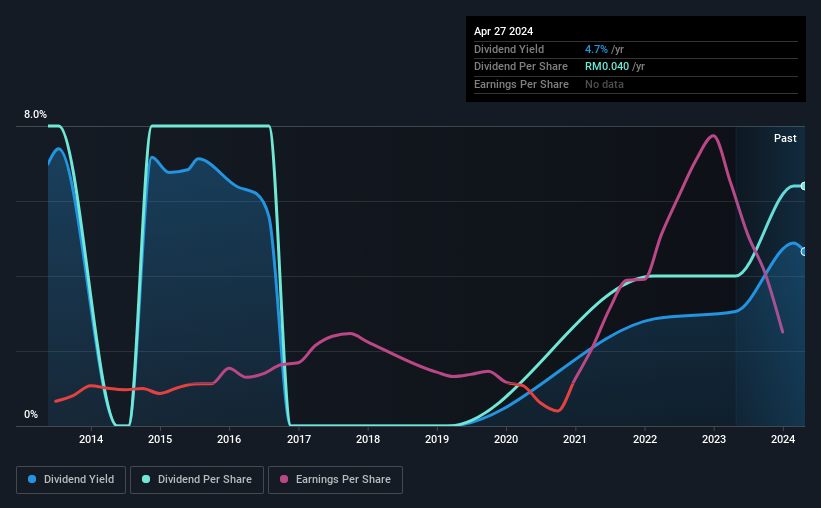- Malaysia
- /
- Metals and Mining
- /
- KLSE:ALCOM
Alcom Group Berhad (KLSE:ALCOM) Has Announced That It Will Be Increasing Its Dividend To MYR0.04
Alcom Group Berhad's (KLSE:ALCOM) dividend will be increasing from last year's payment of the same period to MYR0.04 on 26th of July. This will take the dividend yield to an attractive 4.7%, providing a nice boost to shareholder returns.
Check out our latest analysis for Alcom Group Berhad
Alcom Group Berhad's Payment Has Solid Earnings Coverage
If the payments aren't sustainable, a high yield for a few years won't matter that much. Before making this announcement, Alcom Group Berhad was easily earning enough to cover the dividend. This means that most of what the business earns is being used to help it grow.
If the trend of the last few years continues, EPS will grow by 36.1% over the next 12 months. If the dividend continues along recent trends, we estimate the payout ratio will be 24%, which is in the range that makes us comfortable with the sustainability of the dividend.

Dividend Volatility
While the company has been paying a dividend for a long time, it has cut the dividend at least once in the last 10 years. The dividend has gone from an annual total of MYR0.05 in 2014 to the most recent total annual payment of MYR0.04. This works out to be a decline of approximately 2.2% per year over that time. Declining dividends isn't generally what we look for as they can indicate that the company is running into some challenges.
The Dividend Looks Likely To Grow
With a relatively unstable dividend, it's even more important to see if earnings per share is growing. It's encouraging to see that Alcom Group Berhad has been growing its earnings per share at 36% a year over the past five years. Earnings per share is growing at a solid clip, and the payout ratio is low which we think is an ideal combination in a dividend stock as the company can quite easily raise the dividend in the future.
Alcom Group Berhad Looks Like A Great Dividend Stock
In summary, it is always positive to see the dividend being increased, and we are particularly pleased with its overall sustainability. The company is easily earning enough to cover its dividend payments and it is great to see that these earnings are being translated into cash flow. All in all, this checks a lot of the boxes we look for when choosing an income stock.
Investors generally tend to favour companies with a consistent, stable dividend policy as opposed to those operating an irregular one. Still, investors need to consider a host of other factors, apart from dividend payments, when analysing a company. For instance, we've picked out 3 warning signs for Alcom Group Berhad that investors should take into consideration. Looking for more high-yielding dividend ideas? Try our collection of strong dividend payers.
New: Manage All Your Stock Portfolios in One Place
We've created the ultimate portfolio companion for stock investors, and it's free.
• Connect an unlimited number of Portfolios and see your total in one currency
• Be alerted to new Warning Signs or Risks via email or mobile
• Track the Fair Value of your stocks
Have feedback on this article? Concerned about the content? Get in touch with us directly. Alternatively, email editorial-team (at) simplywallst.com.
This article by Simply Wall St is general in nature. We provide commentary based on historical data and analyst forecasts only using an unbiased methodology and our articles are not intended to be financial advice. It does not constitute a recommendation to buy or sell any stock, and does not take account of your objectives, or your financial situation. We aim to bring you long-term focused analysis driven by fundamental data. Note that our analysis may not factor in the latest price-sensitive company announcements or qualitative material. Simply Wall St has no position in any stocks mentioned.
About KLSE:ALCOM
Alcom Group Berhad
An investment holding company, manufactures and trades aluminum sheet and coils products in Malaysia, the United States, Thailand, India, rest of Asia, Europe, the Middle East, and internationally.
Slight risk and slightly overvalued.
Market Insights
Weekly Picks

Solutions by stc: 34% Upside in Saudi's Digital Transformation Leader


The AI Infrastructure Giant Grows Into Its Valuation
Recently Updated Narratives

Perdana Petroleum Berhad is a Zombie Business with a 27.34% Profit Margin and inflation adjusted revenue Business
Many trends acting at the same time


Engineered for Stability. Positioned for Growth.
Popular Narratives


MicroVision will explode future revenue by 380.37% with a vision towards success


NVDA: Expanding AI Demand Will Drive Major Data Center Investments Through 2026



